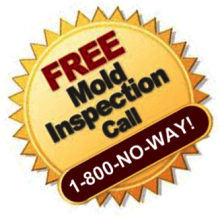There Are No Free Lunches and No Free Mold Inspections

Your Momma always told you, “There’s no free lunch.” More often than not, free comes with a hefty price that ends up costing far more than you thought it would and that has never been truer than in the mold business.
The safest thing consumers can do whenever the word “FREE” is used to sell a mold remediation job is to avoid that contractor all together. Think about it. No business is there to do anything for free. Anyone offering something for free is doing so to sell you something else. While that has become acceptable when it comes to “Buy One – Get One FREE” deals, in the mold business a “free” inspection and testing can end up costing you thousands of dollars for remediation work that may be grossly exaggerated or in some cases doesn’t need to be done at all.
The biggest mold scam is remediation contractors who perform “FREE” mold inspections. When it comes to mold, you do NOT want a mold inspector who is motivated to find mold removal jobs for themselves.
Your Mold Remediator and Mold Inspector MUST be licensed by the State of Florida. Under the Florida statutes, the Mold Remediator cannot perform Mold Remediation on any job where he or she has performed the Mold Inspection within the last 12 months.
This is the oldest mold scam in the mold remediation and restoration industry and it’s easy to pull off because most consumers don’t know enough about mold to realize when they’re being bamboozled into work that is often grossly exaggerated, and in some instances, not even necessary.
Beware of the mold remediation contractor that offers “Free” Mold Inspections and uses terms such as “Black Mold”, “Toxic Mold”, or “Toxic Black Mold”. Those terms are a clear indication that the mold remediation contractor providing the “Free Mold Inspection” is using scare tactics to convince you that you need the ‘emergency’ mold remediation work for your immediate safety. Not likely! It’s more likely that the mold remediation contractor offering the “FREE Mold Inspection” and using those media buzz-words is trying to scare you into more mold remediation than you actually need.
No indoor environmental professional should ever use those words, ever! If that person is using that terminology, he is no professional and you are being played. Ask that individual to stop using unprofessional scare tactics and that you are an educated consumer.
Remember, convenience can cost you plenty. Most people prefer to deal with one contractor for everything because it’s expedient. But when it comes to mold, that expedience can cost you thousands of dollars in unnecessary repairs. There are many reputable Florida Licensed Mold Assessors who do not engage in remediation work. Now you know enough, so don’t risk getting ripped off.
A mold inspection should be completely unbiased. Mold inspectors should have no personal interest in the outcome of an inspection, nor should they ever profit from what they find, either directly by doing the removal themselves, or indirectly by referring work to their friends for a kick-back. Having a mold inspection prior to a remediation project should enhance the results of the clean-up, not add unnecessary costs.
The only way to ensure you will get an unbiased inspection report and avoid this mold scam is to hire a Florida Licensed Mold Assessor who does not perform mold remediation. And always ask if they will be following the ANSI Approved S-520. The Institute of Inspection, Cleaning and Restoration Certification (IICRC) “IICRC S-520 Standard and Reference Guide for Professional Mold Remediation” is a procedural standard and reference guide for the remediation of mold damaged structures and contents. The S-520 is based on reliable remediation and restoration principles, research and practical experience.
The S520 provides a philosophical shift away from setting numerical mold contamination action levels. Instead, it establishes mold contamination definitions, descriptions and conditions (1, 2, 3), and general guidance, which, when properly applied, can assist remediators and others in determining criteria that trigger remediation activities or confirm remediation success.
Contaminated as the presence of indoor mold growth and/or spores, whose identity, location and amplification are not reflective of a normal fungal ecology for an indoor environment, and which may produce adverse health effects and cause damage to materials, and adversely affect the operation or function of building systems.
You know your Momma was right. There are no free lunches and no free mold inspections.
This blog was prepared in conjunction with John P. Lapotaire, CIEC and Florida Licensed Mold Assessor of Microshield Environmental Service of Orlando, Florida. http://microshield-es.com
